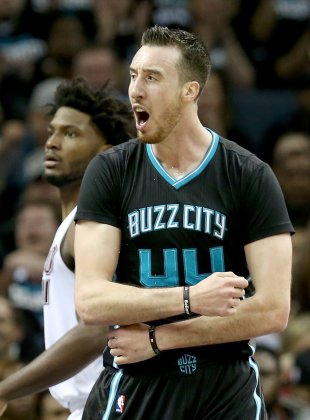 The Charlotte Hornets entered Game 3 of their first-round series with the Miami Heat in a tough spot, having surrendered two huge offensive performances to the East's No. 3 seed for a 2-0 deficit and being forced to play without starting forward Nicolas Batum for at least one game due to a left foot injury. Charlotte would need a lot to get back into the series, including but not limited to a far superior defensive showing and several big performances from players taking on increased roles.
The Charlotte Hornets entered Game 3 of their first-round series with the Miami Heat in a tough spot, having surrendered two huge offensive performances to the East's No. 3 seed for a 2-0 deficit and being forced to play without starting forward Nicolas Batum for at least one game due to a left foot injury. Charlotte would need a lot to get back into the series, including but not limited to a far superior defensive showing and several big performances from players taking on increased roles.
Luckily, the Hornets got everything they required Saturday for the franchise's first playoff victory since 2002. (Note: the Hornets' history includes that of the Charlotte Bobcats and the previous incarnation of the Hornets, which now plays in New Orleans as the Pelicans.) Charlotte limited Miami to 34.2 percent shooting for one of its least efficient performances of the season in a 96-80 win, a huge turnaround considering the Heat scored 72 points in the first half alone in Game 2. Meanwhile, the Hornets turned it over only four times and went 21-of-22 from the line to offset their own poor shooting. Charlotte's victory cuts Miami's series lead to 2-1 and creates fresh intrigue for Monday's Game 4 and Time Warner Cable Arena.
The key stretch of the game was obvious — a 20-1 run that gave the Hornets a commanding lead in the third quarter. Tied at 53-53 after a Goran Dragic jumper with 7:41 on the clock, the Hornets held the Heat scoreless until the 1:04 mark (and without a field goal until 30 seconds later) as they seized full control of the contest.
Much of the scoring came from rookie big man Frank Kaminsky, who scored 13 of his eventual 15 points in the period. Though known as a shooter, Kaminsky excelled in this one with a series of face-up and post moves that various defenders struggled to stop. It was a big improvement for a player who had shot just one field goal in 37 minutes in the first two games of the series.
Kaminsky wasn't the only player to step up with Batum out and star guard Kemba Walker struggling (17 points on 4-of-19 FG). Jeremy Lin helped get the offense going in the first half in his established role as offensive leader of the second unit and finished with a team-high 18 points in 26 minutes. Marvin Williams was also very good, following up a putrid 0-of-10 showing in Game 2 with 12 points on 2-of-3 from beyond the arc.
Yet the Hornets offense wasn't exactly filling it up with regularity while shooting 38.9 percent and 5-of-18 on threes. The biggest success for Charlotte was merely avoiding mistakes. Saturday marked just the 15th time since 1984 that a team has turned it over four times or fewer in a playoff game, a great accomplishment for a team that needs to create as many opportunities as it can with Batum unavailable.
The Heat will head into Game 4 wondering how to recapture their stupendous offense of Games 1 and 2, when they shot nearly 58 percent from the field for an average of 119 points. Game 3's poor showing looks even worse considering Miami scored 28 of its 80 points in the first quarter, thanks largely to a very strong start for Luol Deng, who finished with a game-high 19 points on 5-of-6 shooting from beyond the arc. Very little went right for the Heat — they couldn't get good shots, missed lay-ups, and eventually looked unsure of where to go when they needed to score.
The good news for the Heat is that they still lead in the series, are facing a team unlikely to see the return of one its best players, and can hope for a regression to the mean in Game 4. But the Hornets can be just as confident that they will not experience defensive issues as glaring as the ones they experienced in the two games in Miami. Whatever transpires from here on out, the series looks very competitive once again.
No comments:
Post a Comment